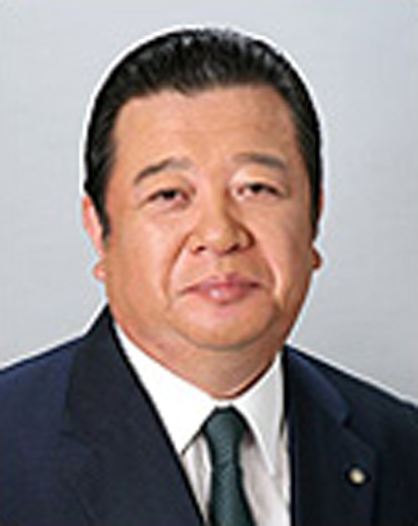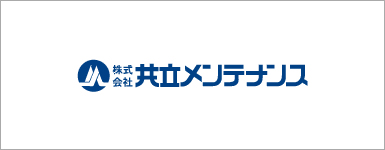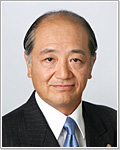| Kyoritsu Maintenance Co., Ltd. (9616) |
|
||||||||||||||
Company |
Kyoritsu Maintenance Co., Ltd. |
||
Code No. |
9616 |
||
Exchange |
TSE 1st Section |
||
Chairman |
Haruhisa Ishizuka |
||
President |
Mitsutaka Sato |
||
HQ Address |
Soto Kanda 2-18-8, Chiyoda-ku, Tokyo |
||
Year-end |
March |
||
URL |
|||
* Share price as of closing on June 24, 2013. Number of shares outstanding as of most recent quarter end does not include treasury shares.
ROE is based on actual results of the previous term end. |
||||||||||||||||||||||||
|
|
* Estimates are those of the Company.
This Bridge Report provides details of Kyoritsu Maintenance Co., Ltd. and a review of first half earnings.
|
|
| Key Points |
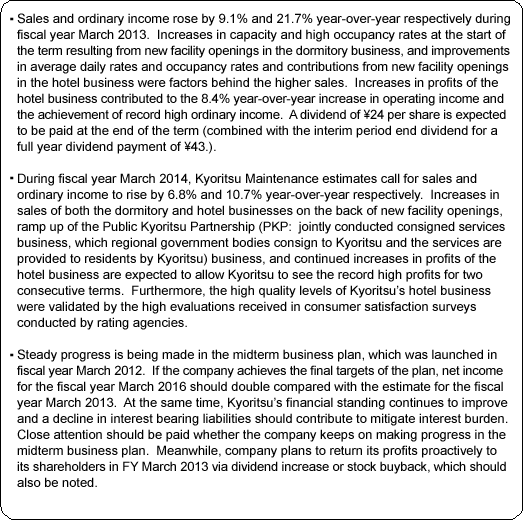 |
| Company Overview |
|
Sales by business segment for fiscal year March 2013 are provided below. 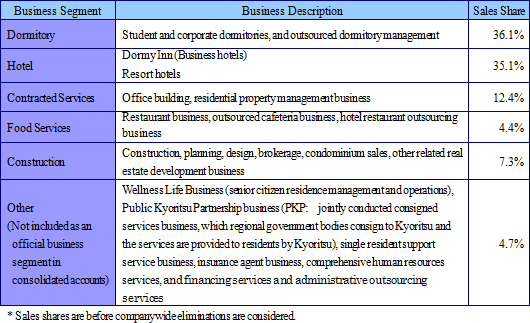 <Corporate History>
Kyoritsu Maintenance was established in September 1979. The founder, Haruhisa Ishizuka, had long been engaged in the food service industry and started the Company by taking on the operations of corporate cafeteria facilities on a consigned basis. In the following year 1980 in Sakura City, Chiba Prefecture, the Company established a two story wooden structure (with 28 small sized rooms) as its first dormitory facility. Based on the principle of providing "food" that "fosters the health and well being of students to put their parents' minds at ease," Kyoritsu was able to steadily expand its student dormitory business through partnerships with various schools. The Company steadily expanded its operating territory to cover the Tokyo, Kanagawa, Nagoya and Osaka regions. In April 1985, Kyoritsu began offering corporate dormitories to employees that offered highly unique features of "individual rooms with commissary functions providing breakfast and dinner," and "large bathing facilities" as comforting amenities for residents. In June 1993, the Company moved its headquarters to its current location and in July of the same year it entered the resort hotel business with the opening of a facility in Nagano Prefecture, followed by their entry to the business hotel realm in August with the opening of a facility in Saitama Prefecture. In September 1994, Kyoritsu listed its shares on the JASDAQ Market (OTC Market), in March 1999 it moved its listing to the Second Section of the Tokyo Stock Exchange, and then to the First Section in September 2001.
|
| Midterm Business Plan: "Kyoritsu Value Up Plan!" |
 (1) Accelerate Growth in Its Core Business
① Hotel Business Deployment within Japan
 ② Dormy Inn Overseas Deployment
In overseas markets, the first overseas facility in Korea, which has been delayed, is expected to be opened in July 2014 and called "Dormy Inn PREMIUM SEOUL Garosugil-St." (215 rooms). In addition, the second facility in Korea is expected to be opened in April 2015 and called "Dormy Inn PREMIUM SEOUL Shin-Nonhyeon" (230 rooms). These openings should mark the full scale launch of overseas operations.
(2) Cultivating New Businesses
During fiscal year March 2012, the Public Kyoritsu Partnership business was launched. This business provides integrated services ranging from consulting to outsourcing designed to match the needs of regional governments undergoing administrative and fiscal reforms. Kyoritsu will take on the non-core services of the government, and contribute to the administrative and fiscal reforms by leveraging its knowhow to reduce costs, provide stable regional employment opportunities, and improve resident services.
① Consigned Services Details
The main consigned services include various facilities operations management, public services facilities operations management, regional development activities, tourism rejuvenation support activities, public asset facilitation and other comprehensive operational services to support regions.Details of specific services are provided below. 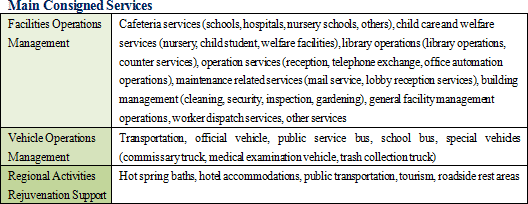 ② Track Record
In the fiscal year March 2012, which is the first fiscal year for PKP business, comprehensive consignment services contracts for 37 projects, including projects in Yubetsu town in Hokkaido and Hidakagawa town in Wakayama, with 16 regional government bodies were signed and sales amounted to ¥910 million. During fiscal year March 2013, operations of hotel and hot spring bathing facilities, roadside rest areas, and other facilities in Minamiaizu town in Fukushima, Chikuhoku village in Nagano, Takahama town in Fukui, Hakusan City in Ishikawa, Kumakogen town in Ehime and other locations were consigned to Kyoritsu for a total of 58 projects from 36 regional government bodies and the sales amounted to ¥1.66 billion. While falling shy of the midterm business plan targets, sales are expected to rise to ¥4.08 billion during fiscal year March 2014.
 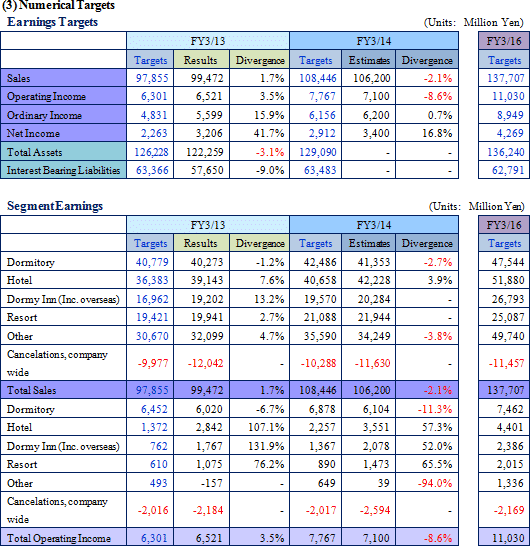  The midterm business plan calls for net interest bearing liabilities to be reduced to ¥52.851 billion in fiscal year March 2012 and to ¥50.668 billion in fiscal year March 2013, but the actual reduction exceeded targets for more than ¥10.0 billion with a decline to ¥48.099 billion in March 2012 and to ¥40.028 billion in March 2013 respectively. Moreover, the fact that over 83% of interests bearing liabilities are based on fixed interest rates is expected to help limit the risk of increases in interest payments from rises in interest rates.  |
| Fiscal Year March 2013 Earnings Results |
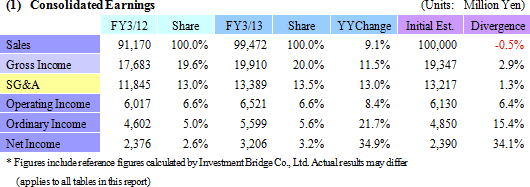 Sales, Ordinary Income Grew by 9.1%, 21.7% Year-Over-Year
Sales rose by 9.1% year-over-year to ¥99.47 billion during fiscal year March 2013. Increases in occupants and high occupancy rates at the term start due to opening of new facilities in the dormitory business, high occupancy rates and improvements in average daily rates arising from new facility openings in the hotel business, and growth in the construction business allowed sales to grow. With regards to profits, a 94.4% year-over-year increase in hotel business operating income was the main driving force behind the 8.4% year-over-year increase in total operating income. Foreign exchange translation gains and a decline in interest payments allowed non-operating income to improve and ordinary income rose by 21.7% year-over-year to a new record high. A dividend of ¥24 per share is expected to be paid at the term end (a total full year dividend of ¥43 per share when combined with the interim dividend.).
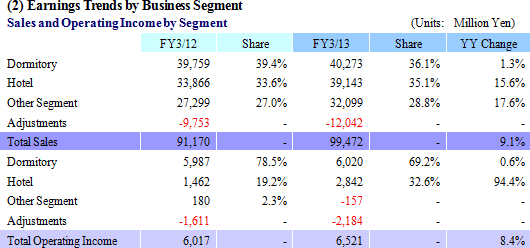 Dormitory Business
Excluding facilities managed on a consigned basis, the total number of facilities operated by Kyoritsu declined by one to 418, and the number of residents rose by 104 from the end of the previous term to 32,413 at the end of the current term. Sales rose by 1.3% year-over-year to ¥40.27 billion. Despite the implementation of a strategy of strict cost management on a facility by facility basis, segment operating income rose by only 0.6% year-over-year to ¥6.02 billion. At the same time, measures designed to reduce the number of vacant rooms contributed to a 0.5% year-over-year increase in occupancy rates to 97.0% at the start of fiscal year March 2014. Conditions for the various types of dormitories operated by Kyoritsu are provided below.
Student Dormitories (Sales Rose 2.0% Year-Over-Year to ¥24.119 Billion)
The societal issue of the declining birthrate was offset by the increase in the advancement rate to universities and vocational schools, and efforts by universities and schools to provide dormitory facilities led to increased demand for student dormitories. Kyoritsu's services for students leverage their unique features including "healthy food menus," "safe and comfortable facilities made possible through full time supervision" and "employment seminars held within dormitories" and are successful in cultivating strong demand by dormitory users. Moreover, new alliances formed with the University of Tokyo, Kansai University, Osaka Medical College, Toin University of Yokohama and others allowed the number of student dormitory residents to rise by 1.1% year-over-year to 19,319 at the end of the term.
Corporate Dormitories (Sales Rose 1.0% Year-Over-Year to ¥9.415 Billion)
The total number of the Japanese workforce increased while the number of new graduate hires declined. However, the reevaluation of corporate dormitories and new employee training facilities functions by large corporations contributed to a 2.1% increase in the number of contracted residents from the end of the previous term to 7,897 at the current term end.
Domeal (Studio Type Condominiums) Business (Sales Fell 0.7% Year-Over-Year to ¥3.560 Billion)
Kyoritsu is responding to the diversifying needs of students to rent their own living quarters and of corporations to find rooms for single employees with the development of studio type condominiums to replace traditional student and corporate dormitories and dormitories with commissary functions. Consequently, the number of residents rose by 1.1% year-over-year to 4,223 at the current term end.In addition to the above mentioned categories, sales of dormitories managed on a consigned basis fell by 0.9% year-over-year to ¥3.178 billion. 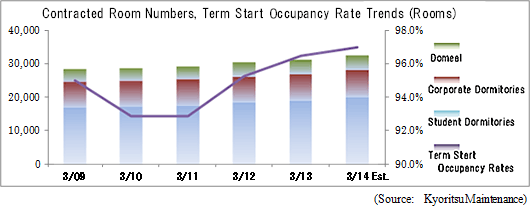 Hotel Business
The opening of six new hotel facilities allowed the total number of hotel facilities operated by Kyoritsu to rise to 69 at the end of the current term from 63 at the end of the previous term, and the number of rooms to rise by 798 to 10,295 over the same period. Sales and operating income rose by 15.6% and 94.4% year-over-year to ¥39.14 and ¥2.84 billion respectively.
Dormy Inn Business Hotel Business (Sales Rose 17.0% Year-Over-Year to ¥19.202 Billion)
Kyoritsu differentiates itself by providing customers with "large hot spring type bathing facilities" and "good tasting breakfast menus". The company managed to meet demand for family trips which tends to be poorly handled by normal business hotels, by providing fine-tuned customer services and promoting web-marketing. Furthermore, the weakening of the yen since the start of the year has contributed to a widening in the customer base with an increase in customers from Korea and other foreign countries.In addition, Kyoritsu was awarded first place ranking in both the business hotel category of the JCSI (Japanese Customer Satisfaction Index) and the J.D. Power Asia Pacific 2012 Japan Hotel Service Customer Satisfaction Survey for hotels under ¥9,000 per night in reflection of the continued favorable reception of its facilities and services by the market. During the current term, five new facilities were opened including "Dormy Inn PREMIUM Shibuya Jingumae," "Natural Hot Spring Kishu no Yu Dormy Inn PREMIUM Wakayama," "Natural Hot Spring Kirizakura no Yu Dormy Inn Kagoshima," "Dormy Inn EXPRESS Matsue," and "Natural Hot Spring Kinka no Yu Dormy Inn Gifu Station Front." Resort Hotel Business (Sales Rose 14.2% Year-Over-Year to ¥19.941 Billion)
Kyoritsu seeks to satisfy customers by providing them with "high quality resort style accommodations at reasonable prices" and "comforting accommodations." During fiscal year March 2013, "Morden no Yu La Vista Appi Kogen" was newly opened. Furthermore, the "Kyoto Arashiyama Natural Hot Spring Kadensho" newly opened during the previous term and other existing facilities have been successful in raising occupancy rates on weekdays and boosting them above the previous year's levels over the full year.
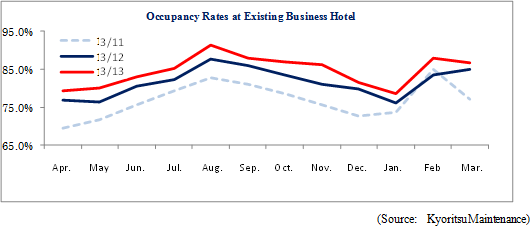 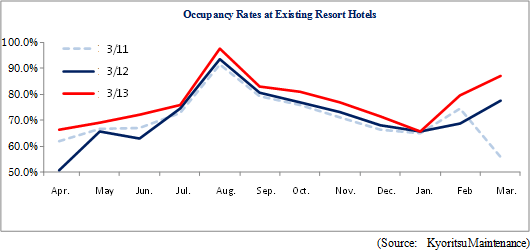 Other Business
While sales rose by 17.6% year-over-year to ¥32.09 billion, an operating loss of ¥150 million was incurred (compared with a profit of ¥180 million in the previous term).In the contracted services business, an increase in orders for construction work contributed to an increase in sales despite the cancellation of large contracts for building maintenance work and allowed sales to rise by 11.5% year-over-year to ¥13.80 billion. However, operating income fell by 59.0% year-over-year to ¥50 million. The food service business suffered from a delay in earnings improvements at some restaurants and an operating loss of ¥120 million was incurred (compared with an operating loss of ¥130 million in the previous term) despite a 9.9% year-over-year increase in sales to ¥4.92 billion. The construction business sales rose by 29.2% year-over-year to ¥8.18 billion on the back of increases in development of dormitories and hotels. However a decline in development work for condominiums for sale led to a 36.4% year-over-year decline in operating income to ¥360 million. Other business segment sales rose by 26.4% year-over-year to ¥5.18 billion, but an operating loss of ¥440 million was incurred (compared with a loss of ¥380 million in the previous term). The increase in loss despite higher sales is attributed to cancellation of large contracts in the consigned building rental business and higher operating expenses associated with the expansion in the PKP business. (3) Financial Condition and Cash Flow
Total assets declined by ¥3.38 billion from the end of the previous term to ¥122.25 billion at the end of the current term due to the reduction in tangible fixed assets. At the same time, a ¥6.62 billion reduction in liabilities to ¥87.4 billion was also achieved due in part to a decline in both debt and bonds. Net assets increased by ¥3.23 billion to ¥34.78 billion on the back of higher retained earnings, and capital adequacy ratio improved by 3.3% points from the end of the previous term to 28.4% at the end of the current term.
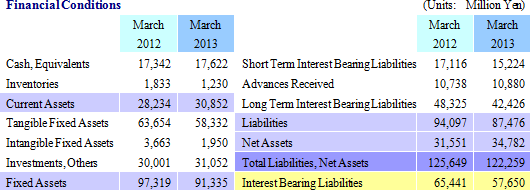  |
| Fiscal Year March 2014 Earnings Estimates |
 Sales, Ordinary Income Expected to Rise by 6.8%, 10.7% Year-Over-Year
During fiscal year March 2014, Kyoritsu's estimates call for sales to rise by 6.8% year-over-year to ¥106.2 billion. Sales of both the dormitory and hotel businesses are expected to rise on the back of contributions from newly opened facilities, along with an increase in sales of the other business segment on the back of growth in the PKP business. The Company's estimates for higher profits are based on the outlook for strong contribution from the hotel segment and the other business segments regaining profitability. The higher sales are expected to allow increased dormitory renovation and opening expenses and higher utility fees to be absorbed, and to raise operating income by 10.7% year-over-year to ¥6.20 billion.
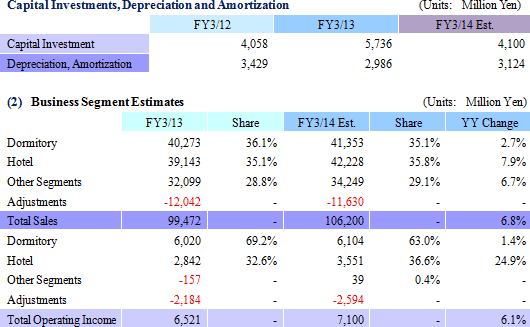 The hotel business segment is expected to be a driver of Kyoritsu's overall earnings and to see growth in sales and operating income of 7.9% and 24.9% year-over-year to ¥42.22 and ¥3.55 billion respectively. On the back of the strong popularity of Dormy Inn business hotels, the Company will endeavor to establish its brand and expand earnings. Furthermore, efforts have begun to expand its operations into other Asian markets with high growth and Kyoritsu seeks to act as a bridge linking Japan to the rest of Asia. At the same time, the Company seeks to accelerate earnings growth by facilitating its capability to accommodate Japanese going overseas and overseas visitors coming to Japan at their hotels. In addition, Kyoritsu will strengthen its service lineup and strictly manage profitability at each of its resort hotels to become the leading hotel in each of the regions where they operate and to satisfy customers by providing "comforting accommodations." The Company will also implement measures to fortify its marketing structure to cultivate new clients and ensure repeat customers. Other business segment sales are expected to rise by 6.7% year-over-year to ¥32.49 billion and operating income is expected to improve from a loss of ¥150 million in the current term to a profit of ¥30 million in the coming term. Kyoritsu will endeavor to achieve profitability in the PKP business and firmly establish its foundation based upon consigned operations of various facilities from regional government bodies to become a new cornerstone of the overall business. 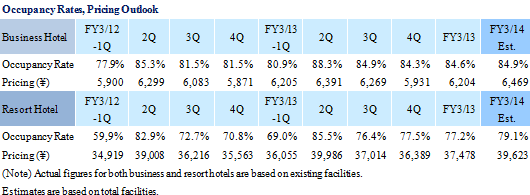 |
| Conclusions |
|
Disclaimer
This report is intended solely for information purposes, and is not intended as a solicitation to invest in the shares of this company. The information and opinions contained within this report are based on data made publicly available by the Company, and comes from sources that we judge to be reliable. However we cannot guarantee the accuracy or completeness of the data. This report is not a guarantee of the accuracy, completeness or validity of said information and or opinions, nor do we bear any responsibility for the same. All rights pertaining to this report belong to Investment Bridge Co., Ltd., which may change the contents thereof at any time without prior notice. All investment decisions are the responsibility of the individual and should be made only after proper consideration.Copyright(C) 2013 All Rights Reserved by Investment Bridge Co., Ltd. |

